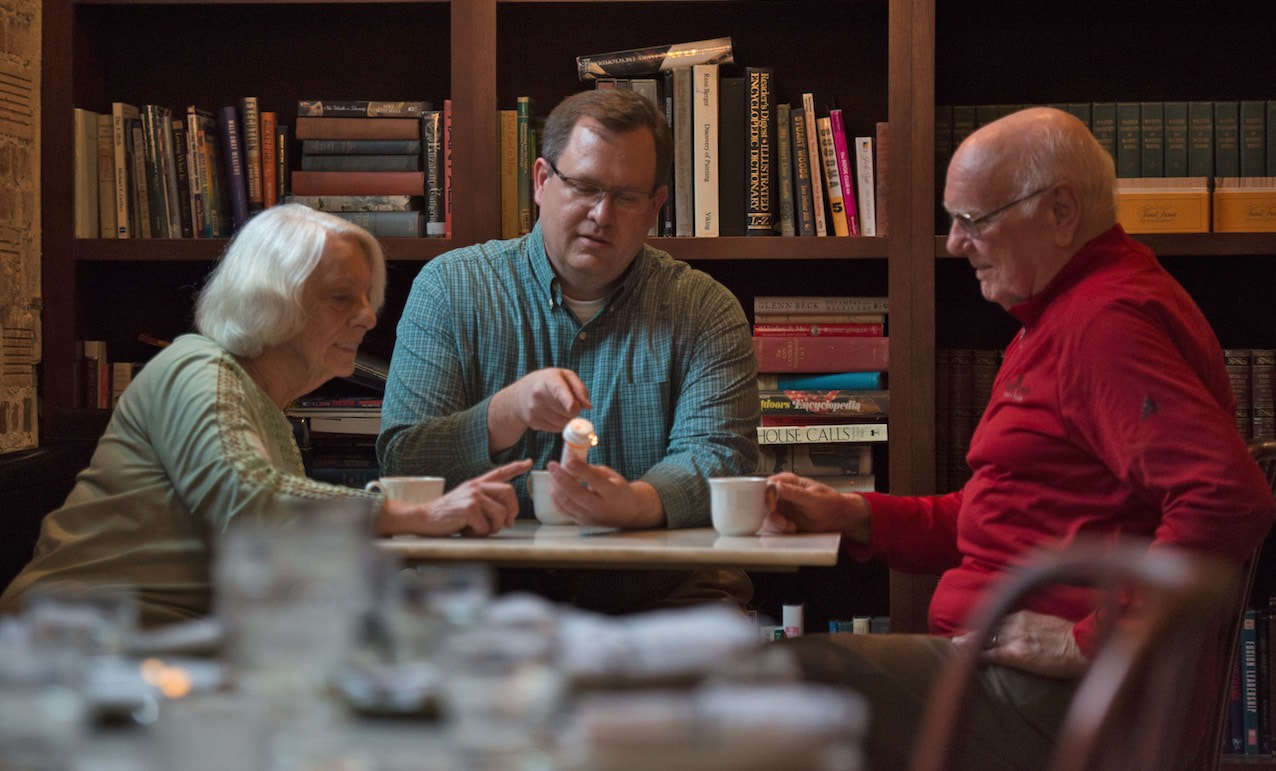|
Rep. Frank Pallone, who has represented parts of Monmouth County in Congress for 30 years, has drafted a bill that would provide welcome relief for families caring for elderly relatives. The legislation, titled the Medicare Long-Term Care Services and Supports Act, would expand the Medicare program to help cover the costs of long-term care – including in-home care. Significantly, the congressman proposes reimbursement for services provided not only by professional caregivers, but also by family members themselves. Pallone faces an uphill battle, to be sure, but the language of the bill recognizes an important fact about elder care that rarely gets acknowledged: Caring for an elderly parent or relative puts a tremendous strain on family members – not only emotionally but also financially. The exorbitant costs of long-term care are well documented (click here for a previous blog post citing various studies and statistics.) What’s not as well understood is the financial impact on family members who help care for an elderly parent or relative. A recent study by insurer Northwestern Mutual sheds some much-needed light on the subject. A survey of more than 1,000 caregivers found that while about half said they were ill-equipped to provide financial support to an elderly relative, two-thirds drew on their own limited resources to do so. Indeed, a third said they spent at least 20% of their monthly budget on caregiving-related expenses such as food, medicine and transportation. “There’s an alarming financial impact from being a caregiver,” said Kamilah Williams-Kemp, vice president for long-term care at Northwestern Mutual. “For some people, those costs can take up a lot of their financial budget.” According to the Bureau of Labor Statistics, about 41 million Americans, age 15 or older, provided unpaid eldercare from 2015-2016. Nearly half of the survey respondents said they took on their roles as caregivers suddenly and unexpectedly. “If caregivers haven’t planned ahead of time, they end up making some rash decisions about how to absorb their caregiving costs … like withdrawing from savings and working more,” Williams-Kemp said. “Those can have long-term repercussions for the caregiver.” And it’s not just the money. Caring for an elderly person who is physically challenged or cognitively impaired can take a very real toll on the caregiver’s relationships and lifestyle. Consider these other findings from Northwestern Mutual’s study:
The bottom line: Caring for an elderly parent or relative is hard work, requiring real sacrifices in time and money. Compensating family members for those sacrifices is a key element of Pallone’s proposal to expand the scope of Medicare. (Click here for the complete text of the bill or here for a section-by-section summary prepared by Pallone’s office.) Currently, Medicare provides very limited coverage for long-term care – namely, for individuals recovering from a serious illness or injury in a rehab facility, including a nursing home. But the benefit runs out after 100 days. And there’s no benefit for in-home care of any kind. In many cases, elderly people requiring the services of in-home nurses or aides are forced to exhaust their life savings in order to qualify for Medicaid, which then can be used to cover the cost of a nursing home. “Today, a senior will spend an average of $140,000 in out-of-pocket costs on long-term care, and more than 15% of seniors will incur costs in excess of $250,000,” according to Pallone’s office. In a statement released earlier this month, Pallone said: “The growing need for long-term care is one of the greatest threats to retirement security for American seniors, and the adult children who care for them. It’s time to expand Medicare to include a long-term care benefit so that millions of seniors and individuals with disabilities no longer have to face financial ruin before they get assistance.” Among the highlights of Pallone’s bill:
I’ve been following Pallone since my days as a cub reporter at the Asbury Park Press, when he was still a member of the New Jersey Legislature. I’ve always found him to be a straight shooter – a politician who is more concerned about solving problems for his constituents than scoring points with ideological purists. But it’s doubtful such a bill can advance in the current political climate.
If nothing else, Pallone’s proposal should stimulate much-needed debate about how the country takes care of its rapidly growing population of senior citizens. Consider: There are currently 48 million seniors in the United States, according to the Census Bureau, including 1.3 million in New Jersey. By 2060, the nationwide total is projected to more than double – to 98 million. Written by T.J. Foderaro
0 Comments
My sister and I had a big advantage when it became clear to us that our mother, then in her early 80s, no longer was independent enough to live on her own: We were great friends.
As our mom became increasingly forgetful and confused, my sister and I were confronted with a dizzying number of questions: Can anything be done to treat her condition? Does she need to go into a nursing home? What can we do to keep her in the home she loves? Does she need help right away, or can we wait a while? Does she have enough money to pay for the services she’ll need? How do we explain all of this to her? Our mother’s dementia also confronted us with the painful reality that she was slipping away from us. Needless to say, it was a chaotic and emotional time for my sister and me, who also were juggling busy careers and families of our own. If my sister and I hadn’t been close friends – if we didn’t see eye-to-eye on most things – I’m not sure how we would have gotten through that difficult period. If there’s one thing I learned caring for my mother in her final years, it’s the importance of communication among family members and friends. A mountain of research and professional advice support this idea. A Place for Mom, a national agency that offers advice on senior living, warns that caring for elderly parents can lead to conflicts between siblings and other family members – which can make the job at hand a great deal more difficult. “As elderly parents begin to rely on family for more support, the amount of conflict between adult children can increase. Dealing with a parent’s care can rekindle sibling rivalries that have lain dormant for years, and the discord can tear families apart.” That may sound extreme, but many experts agree. One organization, the Family Caregiver Alliance, goes so far as to suggest that “a drink may make everyone more comfortable and more able to talk.” But, of course, “overconsumption should be avoided.” Columnist Jim Zientara, a financial advisor who often writes about issues facing the elderly and their families, says caring for an aging parent or relative can put tremendous strains on family relationships. “One sister may live miles away and pay next to no attention to the parent, yet demand things be done her way instead of letting the local sister do what she feels is best,” he writes. And make no mistake, he adds: It’s usually women who bear the brunt of the burden. His advice: “Encourage open communication with your family to figure out ways to share the financial, emotional and time burdens. Hold regular meetings on the telephone or via email to discuss issues, set priorities and delegate tasks.” Most experts agree that holding a family meeting, preferably in person, is an essential starting point. I remember meeting my sister for dinner in Red Bank after we visited our mom at Riverview Medical Center early on in the process. Those two hours we spent alone, uninterrupted by children or other distractions, allowed us to connect emotionally and share ideas about what to do next. The Family Caregiver Alliance offers a comprehensive “how-to” guide on planning and conducting a family meeting. “When taking care of an elderly parent or another relative, family members need to work cooperatively,” the alliance notes. Holding a family meeting is key to getting everyone on the same page. Although it may sound simple, organizing a constructive meeting that produces results is harder than you might think. To start with, who should be invited? “In some families, only a husband/wife and their children are considered family. In other families, aunts, uncles, cousins, current and ex-in laws, and close friends may be included in the definition of family. When planning a family meeting, it is important to include everyone who is or will be part of the caregiving team.” Then there’s the question of whether to include the elderly parent or relative who is the subject of the meeting. That will depend on his or her mental state. Elderly family members “usually do not want to be excluded from family events, and their preferences for care must be considered. However, if someone has dementia or another condition where he/she might misunderstand the purpose of the meeting, it might be appropriate to hold at least the first meeting without him/her present.” If certain family members have trouble getting along or communicating, the alliance recommends engaging the help of an outside facilitator. This could be a priest or minister, family doctor, psychologist or social worker. The next step is to draw up an agenda – yes, an agenda. Just as in the business world, a family meeting will be much more fruitful if there’s a list of priorities to guide the discussion. An agenda might include some or all of the following topics:
In many cases, such meetings will bring out long-simmering tensions and conflicts among family members, possibly triggering emotional outbursts and hurtful comments. That’s why the alliance suggests not trying to pack too much into the first meeting, and instead plan on holding a series of meetings. Even if some family members can’t physically attend each meeting, they can listen in remotely or get briefed later on. “Remember that you can’t resolve long-standing family issues with one such meeting. The task is not to ‘fix’ the family, but rather to have everyone on the same team, as much as possible, in caring for someone who is ill.” A final piece of advice from the alliance: Memorialize decisions made in the meeting by writing them down and sharing copies with all family members. This will help keep everyone focused on achieving the main goal: ensuring that an elderly parent or other relative receives the comfort, support and love they deserve in their final years. Written by T.J. Foderaro I’ll never forget the time I gently suggested to my mother, then in her late 70s, that she didn’t need a third (or was it a fourth?) glass of wine. If looks could kill, I would have predeceased her by five years.
For my mother, wine was one of life’s simple but essential pleasures — up there with cigarettes, butter and The New Yorker magazine. Every evening, usually between 5 and 6 p.m., she’d fetch a goblet from the cabinet, deposit a couple of ice cubes and fill the glass with pinot grigio. Typically, she was on her third glass by 8 p.m. And if she had company, there might even be a fourth, possibly a fifth. As a wine lover myself, I never begrudged my mother her nightly tipple — until age started to catch up with her. As she became less steady on her feet and less focused mentally, it dawned on me that even a moderate amount of wine could make her more susceptible to a fall — or worse. What if she forgot to lock her door before bed? What if she forgot to turn the oven off? Thus it happened one night, with little forethought on my part, that I blurted out something to my mother about having had enough wine. This led to a discussion that quickly escalated into an argument that exploded into a brief shouting match — one of the few times I raised my voice to my mother. By that time, she’d forgotten about pouring herself another glass of wine. I apologized. As time passed, I found myself challenging my mother on a range of decisions I had never previously questioned. “Did you really mean to give $250 to a local charity?” “Don’t you think it’s time to stop driving?” “What do you mean you want to get a dog?” Such questions irked my mother. Her reactions ranged from hostile stares to exclamations of, “It’s my money!” In retrospect, one of the most difficult things about helping my mother “age in place” — that is, continue living in her own home — was constantly navigating the boundaries between proper concern for her safety and being a perfect pain in the ass. My efforts to control my mother’s behavior, however well-intentioned, were extremely frustrating for her. And it led to strains in our relationship. Finding the right balance between what’s responsible and what’s meddlesome is the subject of an excellent article in the Wall Street Journal titled, “Who’s in Charge Here? Aging Parents Resist Interfering ‘Helicopter’ Children.” We’re all familiar with “helicopter parents” — those who try to micromanage every aspect of their kids’ lives. But as our parents grow older and less independent, there’s a tendency among their children to become “helicopter kids.” Joshua Coleman, a psychologist who specializes in family dynamics, says there’s a fine line between being “an appropriately concerned adult child and an overly worried helicopter" child. “If a parent is in an accident, it might be time to talk about driving,” he told the Wall Street Journal. “But if Mom doesn’t want to wear a hearing aid, it might be wise not to nag. Maybe she doesn’t want to listen to anyone at the moment.” William Doherty, a family therapist and professor at the University of Minnesota, believes adult children need to ask themselves whether they’re intervening for their parents’ well-being or to alleviate their own worries. “If your 80-year-old father is still driving, you worry” — even if he is capable of driving, Doherty said. “If he is not driving, you don’t worry, but your father has had a big loss.” The Journal article quotes a Harvard University psychologist who observes, wisely, that even small, well-intentioned acts can send the wrong message to parents. “If a parent fumbles with the key when trying to unlock a door, kids should be patient and wait, rather than grabbing the key and taking over,” advises Dr. Ellen Langer. “While you may be trying to be helpful, the message, deliberate or not, is that you are competent and the parent isn’t.” David Solie, an expert in geriatric psychology, cautions adult children against trying to make sure everything is perfect. “Don’t point out everything that they forgot, or that they aren’t as clean as they used to be,” he said. “Cut them some slack. If they want to date, don’t stand in the way. “Allow them to be happy.” Another expert, Laura Carstensen of Stanford University’s Center on Longevity, offers sound advice for striking the right balance with aging parents: “Unless a parent is cognitively impaired and not aware of the level of his or her impairment, children need to respect the parent’s decision.” Of course, gauging whether or not an elderly person is cognitively impaired – and to what extent they’re aware of the impairment – is no simple matter. That will be the subject of a future blog post. Written by T.J. Foderaro |
AuthorT.J. Foderaro Archives
February 2020
Categories
All
|
Copyright © 2023, Twin Lights Home Care, All RIghts Reserved



 RSS Feed
RSS Feed
